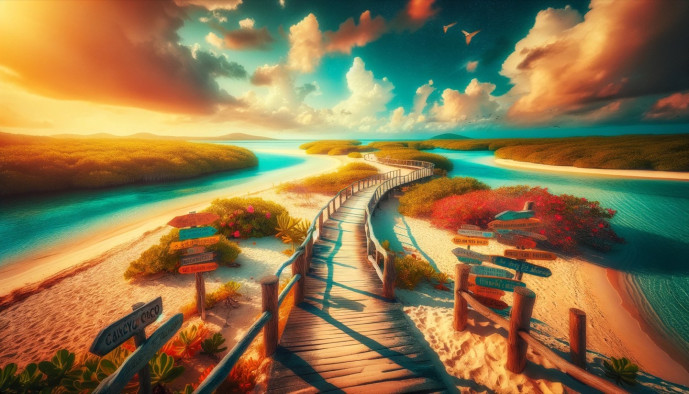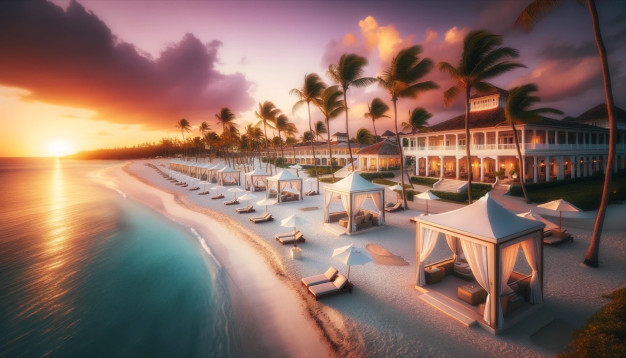Cayo Coco Travel Guide
Uncover Cayo Coco's highlights: Attractions, accommodation, and costs

In the middle of the turquoise waters of the Caribbean, Cayo Coco is one of the most popular seaside resorts of Cuba.
But under its enchanting appearances, is it really a small idyllic and natural paradise?
Is it the best place to put your suitcases in Cuba? We tell you everything!
Cayo Coco in a few words
Located in the Jardines del Rey Archipelago, in the Province of Ciego de Ávila, Cayo Coco is the 4th largest island of the country.
It is also one of the most touristic places in Cuba.
Cayo Coco, like the surrounding cayos, is not inhabited by Cubans.
And for good reason: the vast tourist complexes constitute the only infrastructures of the island, and, like Varadero, Cayo Guillermo or Cayo Levisa, the island is not accessible to Cubans except for those who are part of the staff of hotels.
Hotels are concentrated in the north.
The rest of Cayo Coco (about 85%) is covered with mangrove and therefore difficult to access.
There, in the middle of mangroves, between 130 and 150 species of birds have taken up residence (cormorants, pelicans, flamingos, etc.).
The island is named after a white ibis, called “coco” by the locals.
How to get to Cayo Coco
Cayo Coco is connected to the main island of Cuba by a 27 kilometers long road-dike.
There is no bus connection, but you can go to the island by road, either by yourself if you are motorized, or by cab.
Count about 40 CUC for the trip from Moron, about 60 CUC from Ciego de Avila.
However, most of the tourists arrive directly at Cayo Coco airport.
Domestic flights chartered by the Cubana company regularly reach the island from Havana.
Air Canada also offers flights (with stopovers) between Paris and Cayo Coco.
Get around Cayo Coco
A Transtur minibus provides a daily shuttle service between the different hotels and places of interest on the island.
Count 5 CUC per person per day.
Things to do in Cayo Coco
On the program in Cayo Coco ? Relaxation, water sports and diving.
Diving centers
Cayo Coco has two diving centers:
- The Blue Coco Diving (located in the HotelPullman Cayo Coco)
- The Dive Center Marina Gaviota Cayo
Coco These two centers offer excursions to the diving spots around Cayo Coco.
Count about 40 CUC per dive (+ 10 CUC for the equipment).
The Dive Center Marina Gaviota Cayo Coco also organizes catamaran cruises, fishing trips and offers boats for rent.
Kitesurfing
Several areas specifically dedicated to kitesurfing have been delimited in Cayo Coco.
In order to have access to these areas, visitors must pay a fee of 25 CUC.
These fees are included in the rentals and trainings, which vary between 110 CUC for one hour of training and 830 CUC for 12 hours.
Cayo Coco has 2 kitesurfing schools:
- Kitesurf Cuba Travel
- -Horizon 5 -Coco-Kite
3 other surfing schools offer their services on the neighboring island of Cayo Guillermo.
Horse and carriage rides
As everywhere in Cuba, it is possible to explore Cayo Coco on horseback.
The rides lead visitors to discover the beaches of the island and on hiking trails.
Carriage drivers also stand in front of the main hotels of Cayo Coco offering tours of the island.
As for the budget, count between 5 and 30 CUC per person depending on the type of ride and its duration.
Spas in Cayo Coco
The island has two spas that invite travelers to a relaxing break away from the hustle and bustle: -Acuavida Spa Talaso -Heiwa Spa (Plaza Los Flamencos) Each of these two spas has a swimming pool, a Jacuzzi, a sauna and of course massage rooms.
Shopping malls
With its two shopping malls, the island should delight shopaholics:
- Centro Comercial La Gaviota: artisanal market and stores (cigars, souvenirs, jewelry, beach items, etc…
- Plaza Los Flamencos: artisanal market, nightclub, spa, beauty salon, bowling, restaurant, jewelry store, cigar store.
Cueva del Jabali
The Cueva del Jabali is a cave converted into a cabaret and a nightclub.
What a way to party in an unusual place! But be careful with your head, the ceiling is low..
Ocio Club Game Center
The Ocio Club Game Center features miniature golf, pool tables, arcade games and a bar.
Cayo Guillermo
Linked to Cayo Coco by a road, Cayo Guillermo is an islet of 13 km2.
Mostly known for the paradisiacal Playa Pilar, Cayo Guillermo is very similar to Cayo Coco, but maybe a little more confidential.
On the program: sunbathing and water sports!
Hotels in Cayo Coco
The hotels of Cayo Coco are concentrated in the north of the island.
We recommend two hotels which, we are sure, will make your stay in Cayo Coco an unforgettable moment!

Melia Cayo Coco
the hotel overlooks a private beach and includes rooms on stilts.
On site, you will find a tennis court, a hairdresser, a souvenir store, a car and bicycle rental service, a gym, a nightclub, a wellness area… The swimming pool is really beautiful.
However, children are not allowed in this hotel.
Pullman Cayo Coco
located on the beachfront, the hotel is modern, which is far from always being the case in Cuba! It includes all the infrastructures one can dream of for a successful all-inclusive stay: swimming pool, tennis court, gym, wellness area, restaurant, diving center, etc.
Children are welcome here and even have access to a dedicated playground!
Natural paradise or impersonal tourist complex?
As for Varadero, it is difficult to frankly advise or advise against Cayo Coco.
It all depends on the way you want to travel to Cuba, your expectations and your priorities
If you are looking for a relaxing and wellness vacation, and you are leaning towards an all-inclusive stay, then Cayo Coco is made for you.
On the other hand, if you are fond of cultural visits and discoveries, skip it.
One last remark: Cayo Coco is isolated from the main Cuban tourist sites.
If you want to put your bags in a seaside resort but also want to explore the cultural heritage of the island, then we recommend you rather Varadero.
There, you will be able to make more easily day trips to discover the rest of the island (Trinidad, Havana., Santiago de Cuba..).